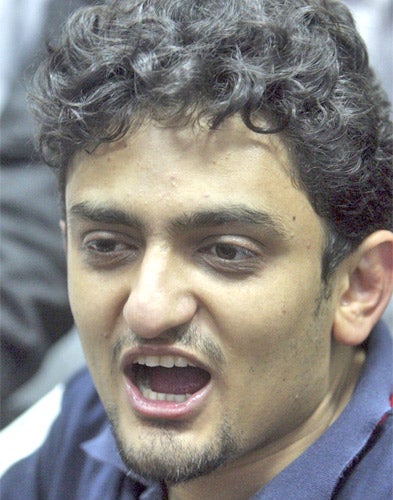Rallying cry from freed online activist galvanises crowds

Your support helps us to tell the story
From reproductive rights to climate change to Big Tech, The Independent is on the ground when the story is developing. Whether it's investigating the financials of Elon Musk's pro-Trump PAC or producing our latest documentary, 'The A Word', which shines a light on the American women fighting for reproductive rights, we know how important it is to parse out the facts from the messaging.
At such a critical moment in US history, we need reporters on the ground. Your donation allows us to keep sending journalists to speak to both sides of the story.
The Independent is trusted by Americans across the entire political spectrum. And unlike many other quality news outlets, we choose not to lock Americans out of our reporting and analysis with paywalls. We believe quality journalism should be available to everyone, paid for by those who can afford it.
Your support makes all the difference.Hosni Mubarak's regime yesterday failed once again to convince the huge crowds in Tahrir Square that its commitment to political reform was sufficiently meaningful for the demonstrations to come to an end.
In a clear indication of the continuing solidity of the 15-day-old protest against Mr Mubarak's presidency, the 100,000-strong crowd – galvanised by an emotional TV interview on Monday given by one of the online organisers of the 25 January protest, 30-year-old Google employee Wael Ghonim, after his release from 12 days of detention – appeared impervious to the blandishments of a television appearance by Omar Suleiman. The Vice-President announced that Mr Mubarak had endorsed the creation of a timetable for a "peaceful and organised transfer of power".
Mr Ghonim, who wept when told that up to 300 people may have been killed during the protests, was cheered when he made a brief appearance in the square. "We will not abandon our demand and that is the departure of the regime," he told the crowd. Speaking softly, Mr Ghonim starting by offering his condolences to the families of those killed.
"I'm not a hero, but those who were martyred are the heroes," he said, before leading a chant of "Mubarak leave, leave".
While the protesters have taken pride in the absence of a leadership that can act as their public representatives, around 130,000 people had – by last night – joined a Facebook group nominating Mr Ghonim to be the spokesman of their uprising.
In his television interview Mr Ghonim called the protests "the revolution of the youth of the internet", and declared: "We are not traitors."
Mr Suleiman insisted that Mr Mubarak had fully supported "this national dialogue, emphasising that it puts our feet on the right path out of this ongoing crisis".
But the Muslim Brotherhood – one of the groups that met the Vice-President on Sunday – called the reforms on offer "partial" and said that Mr Mubarak must resign.
Abdul Rahman Yousef, a prominent figure in Mohammed ElBaradei's National Association for Change, acknowledged a distinction between the "physical" and "political" departure of Mr Mubarak before the six-month deadline he has set himself.
Since the President could simply hand over his powers while remaining a figurehead, Mr Yousef said: "You have to ask the people here if they would accept that." He also acknowledged that new moves might be necessary for the demonstrators to maintain their initiative, such as a possible march on the state television station – which remains closely guarded by an army tank cordon – or on one of the presidential palaces.
As well as 5,000 university professors and teachers who had earlier been blocked by security forces when they attempted to march on the Interior Ministry, the protesters included a prominent Mubarak-appointed Egyptian judge and feminist, Tahaan Gebaly, who is a vice-president of both the constitutional and supreme courts. "I am here as a patriotic citizen of Egypt," she told The Independent. Adding that she wanted Mr Mubarak to stand down, she said: "We have a revolution and that revolution can create a new legitimacy and a new constitution."
Asked if she feared dismissal by the regime if Mr Mubarak stayed in power, she said, smiling: "I don't care."
What the 'Google Hero' said
* "This is the revolution of the youth of the Internet. This is the revolution of the youth of the Internet, which then became the Revolution of the youth of Egypt. And now it's become the revolution of all of Egypt. There is no [one] hero... We all are heroes. That's it."
* "Right now, we are in a time that if someone has good intentions, he's made out to be a traitor. You know why? People think that bad is the norm. But that's not true. I saw 25th [of January] personally... and I was so proud I am Egyptian."
* "I was just a mouthpiece [for the revolution], I was a horn. I was honking and telling people to go out."
Join our commenting forum
Join thought-provoking conversations, follow other Independent readers and see their replies
Comments